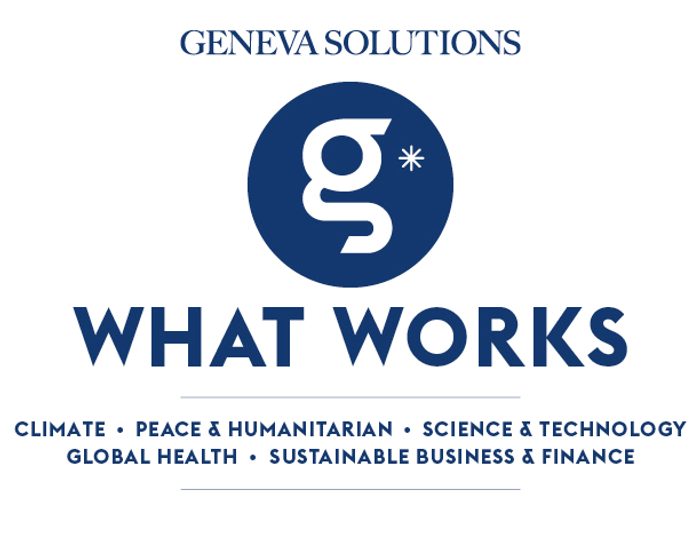Good morning, this is Kasmira. Historic hearings that kicked off this week at the International Court of Justice are examining, for the first time, what governments worldwide are legally required to do to protect current and future generations from climate change.
For vulnerable small island nations like Vanuatu, which are disappearing under rising sea levels, “this may well be the most consequential case in the history of humanity”, as its special climate envoy told judges at the Hague. It could set a precedent for future lawsuits in courtrooms worldwide – and for work here in international Geneva. |

|

Officials from the United States, Russia and Fiji prepare to give evidence during climate hearings at the International Court of Justice in The Hague, The Netherlands, 4 December 2024. (Keystone/EPA/Lina Selg)
|
|
Cynthia Houniuhi was “one of those students” who dreamt up a plan five years ago to seek a so-called advisory opinion from the United Nations’ highest court that would spur the big carbon-emitting countries to take action on climate change.
In 2019, in a classroom at the University of the South Pacific in Vanuatu, 27 law students hailing from eight Pacific Island countries banded together to find “the most progressive legal pathways” to address climate change.
They set their sights on nothing less than the International Court of Justice (ICJ) and, against all odds, their ambitious campaign, spearheaded by the diplomatic efforts of the government of Vanuatu, made its way all the way from the classroom to the Hague in the Netherlands, where the court began hearing evidence this week.
“My people’s land is nearing a critical point on the verge of being completely engulfed by the rising seas,” Houniuhi said, addressing the 15 judges in the wood-panelled courtroom on Monday and the world watching via livestream outside.
The Solomon Islander warned that the fate of future generations of people living on the islands relied on the decisions “of a handful of large emitting states” responsible for climate change. She joined other spokespeople for the Melanesian group, which opened the proceedings, in calling for an urgent legal response to climate change.
Read the full story on Geneva Solutions.
|
|
|
INTERNATIONAL GENEVA GOES GREEN.
Dozens of organisations in Geneva have adopted a blueprint to reduce their carbon emissions by an average of 30 per cent by 2030.
|
|
📝What it's about.
Launched in 2020 by the Swiss diplomatic mission, the 2050 Today initiative aimed to quantify the CO2 emissions of over 600 diplomatic missions, international organisations and other NGOs in Geneva and help them shrink their carbon footprint.
|
|
🧮 Balance.
On Wednesday, 36 of them, which employ around 19,000 people, adopted a climate roadmap towards that goal. If they succeed, that will amount to reducing roughly 53,000 tonnes of CO2. That’s how much 4,100 Swiss residents emit in a year.
|
|
👤Who’s playing ball.
The do-gooders range from UN agencies, such as the UNHCR and the WMO, to some 13 diplomatic missions across regions to small NGOs like the Kofi Annan Foundation and academic institutions like the University of Geneva.
|
|
✅How they’re doing it.
Their actions are simple yet effective, like opting for thermal heating networks, providing bikes for commuting, encouraging the use of trains instead of planes for work travel, potting plants in the office, reducing single-plastic use to a minimum and offering vegetarian and locally sourced food in cafeterias or events.
|
|
Here's what else is happening
|

(IFRC)
|
|
Ahead of International Volunteers Day, the Red Cross movement mourned 31 of its colleagues killed in action in 2024, one of its highest death tolls on record. Staff of the International Federation of Red Cross and Red Crescent Societies and Geneva Red Cross volunteers gathered at the IFRC’s premises in a moment of silence to pay tribute to the fallen.
Over half of those killed were from the Palestinian Red Crescent, while eight were Sudanese volunteers. This year has been the bloodiest recorded for the humanitarian sector at large, with the UN announcing last month that 281 humanitarians had been killed since the start of the year, most of whom were also Palestinians killed in the war in Gaza.
|
|
|
GS news is a new media project covering the world of international cooperation and development. Don’t hesitate to forward our newsletter!
Have a good day!
|

|
|
Avenue du Bouchet 2
1209 Genève
Suisse
|
|
|
|









